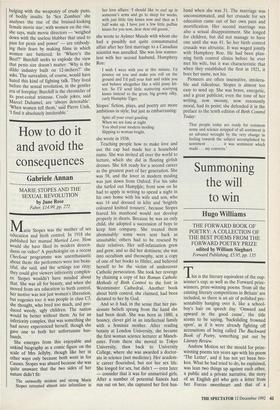How to do it and avoid the consequences
Gabriele Annan
MARIE STOPES AND THE SEXUAL REVOLUTION by June Rose Faber, £14.99, pp. 272 Marie Stopes was the mother of sex education and birth control. In 1918 she published her manual Married Love. How would she have liked its modern descen- dants on video? A psychologist on a recent Checkout programme was unenthusiastic about them: the performers were too beau- tiful, she said, and the settings too ritzy; they could give viewers inferiority complex- es. Stopes wouldn't have minded about that. She was all for beauty, and when she moved from sex education to birth control, her motive was not just women's liberation, but eugenics too: it was people in class C3, she thought, who bred too much, and pro- duced weedy, ugly children. The nation would be better without them. As for an inferiority complex, that was something she had never experienced herself, though she gave one to both her unfortunate hus- bands.
She emerges from this enjoyable and unkind biography as a comic figure on the scale of Mrs Jellyby, though like her in other ways only because both went in for Causes. Stopes was absurd because she was quite unaware that the two sides of her nature didn't fit:
The outwardly strident and strong Marie Stopes retreated almost into infantilism in her love affairs: 'I should like to curl up in someone's arms and go to sleep for weeks, with just little tiny kisses now and then as I half wake up. I have just a few little puffsie kisses for you now, dear dear old goosie,'
she wrote to Aylmer Maude with whom she had a possibly not quite consummated affair after her first marriage to a Canadian scientist was annulled. She was less somno- lent with her second husband, Humphrey Roe:
I wish I were with you at this minute. I'd pounce on you and make you roll on the ground and I'd pull your hair and tickle you and behave altogether like a wild pussy kit- ten. So I'll send little scattering scurrying kisses instead to the great, big growly silky, curly Humphle Tiger.
Stopes' fiction, plays, and poetry are more ambitious in style, but just as embarrassing:
Spite all your cruel goading When we are lone at night You shed your modern moding Slipping to woman bright,
she wrote in 1938.
Teaching people how to make love and use the cap had made her a household name. She was invited all over the world to lecture, which she did in floating girlish dresses. She felt ready for a second career as the greatest poet of her generation. She was 58, and the lover in modern moding was just down from Oxford. For his sake she turfed out Humpble; from now on he had to apply in writing to spend a night in his own home with his wife and son, who was 14 and dressed in kilts and `brightly coloured knitted trousers', because Stopes feared his manhood would not develop properly in shorts. Because he was an only child, she adopted a succession of boys to keep him company. She treated them abominably: some were sent back as unsuitable; others had to be rescued by their relatives. Her self-infatuation grew and grew, and so did her dottiness; she was into occultism and theosophy, sent a copy of one of her books to Hitler, and believed herself to be the victim of undercover Catholic persecution. She took her revenge by chaining a copy of her Roman Catholic Methods of Birth Control to the font in Westminster Cathedral. Another book about birth control, she claimed, had been dictated to her by God.
And so it had, in the sense that her pas- sionate beliefs sprang from the hand she had been dealt. She was born in 1880, a bouncy, clever girl in an intellectual family with a feminist mother. After reading botany at London University, she became the first woman science lecturer at Manch- ester. From there she moved to Tokyo University, then back to University College, where she was awarded a doctor- ate in science (not medicine). Her academ- ic career flourished, but not her sex life. She longed for sex, but didn't — even later — consider that it was for unmarried girls. After a number of potential fiancds had run out on her, she captured her first hus- band when she was 31. The marriage was unconsummated, and her crusade for sex education came out of her own pain and mortification. Her second marriage was also a sexual disappointment. She longed for children, but did not manage to have one until she was 41. So her birth control crusade was altruistic. It was waged jointly with Humphrey Roe. He had been plan- ning birth control clinics before he ever met his wife, but it was characteristic that when they established the first in 1921, it bore her name, not his.
Pioneers are often insensitive, intolera- ble and ridiculous. Stopes is almost too easy to send up. She was brave, energetic, and a great publicist; even the tone of her writing, now swoony, now resonantly moral, had its point; she defended it in the preface to the tenth edition of Birth Control Today:
That people today are ready for common sense and science stripped of all sentiment is an advance wrought by the very change in feeling towards the subject accomplished by sentiment . . . it was sentiment which made ... my converts.'


































































 Previous page
Previous page